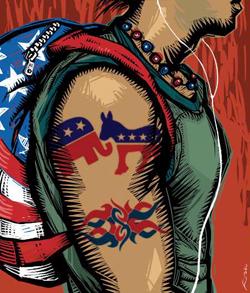Dickinson College
What Students Want to Know

Sonic Youth
A panel comprised of Dickinson faculty will outline positions held by President Barack Obama and Gov. Mitt Romney on four key topics: health care and insurance; national security and foreign policy; the economy and the fiscal cliff; and social issues. A question-and-answer session will follow.
Panelists Douglas E. Edlin, associate professor of political science, will discuss health care and health insurance; Andrew T. Wolff, assistant professor of political science and international studies, will detail the candidates' views on national security and foreign policy; Michael J. Fratantuono, associate professor of international studies, business and management, will discuss the economy and the fiscal cliff; and Stephanie Gilmore, assistant
professor of women's & gender studies, will outline the candidates' views on social issues. Student Senate President Andrew Chesley '13 will moderate the discussion.
The event serves to educate young voters, many of whom are first-time voters, about key issues, so they can make informed decisions on Election Day. Dickinson students, including members of the College Democrats and College Republicans, selected the topics.
"I've heard from a number of students who are excited about voting for the first time, but who feel they don't have all the information they need to make the best decision on Nov. 6," says Chesley. "This event will inform them about the issues at stake."
According to Instructor of Political Science Brandon Lenoir, who studies voter mobilization, the event also promotes voting as a lifelong habit. "The best predictor as to whether someone will vote in this election is if they voted in the last election," says Lenoir. "This is the first presidential election for students between the ages of 18 and 21, so they have not yet developed the habit of voting. If they vote this year, it increases the probability that they will continue to vote in the future."
The event is sponsored by The Clarke Forum for Contemporary Issues and will be broadcast at a later date on the Pennsylvania Cable Network (PCN).
Published May 30, 2013